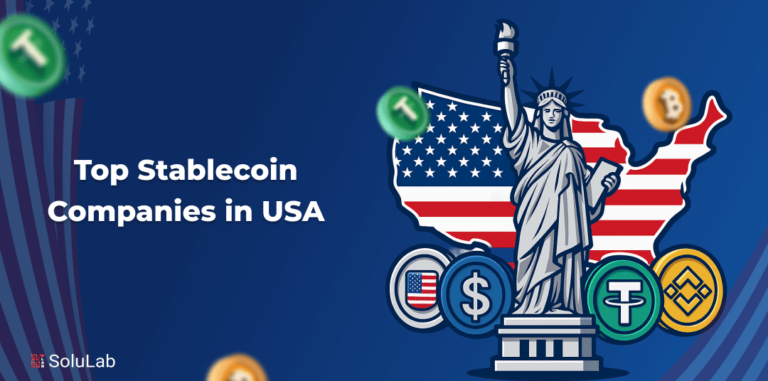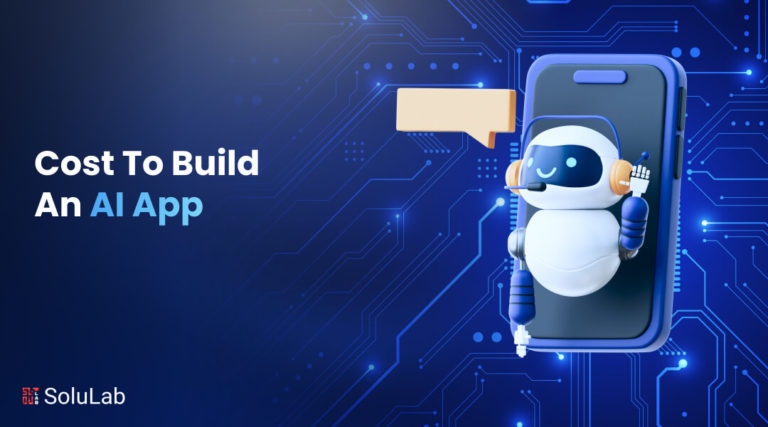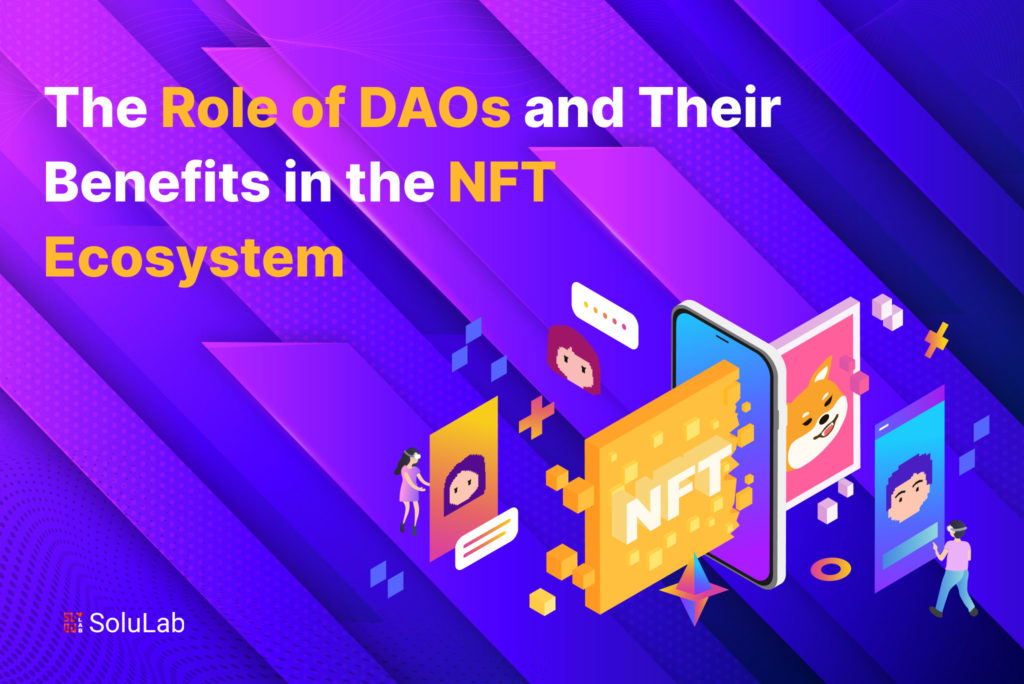
Since their beginnings, NFTs have advanced substantially. As of May 2022, more than 1 million crypto users have acquired or traded NFTs, and the worldwide NFT industry is expected to increase from $3 billion in 2022 to $13.6 billion in 2027. Along with NFTs’ growing acceptance, other blockchain technologies, including Decentralized Autonomous Organizations (DAOs), are gaining traction in the digital arena by contributing to NFT marketplace platforms.
Is it possible to believe how out of control things have become with JPEG photographs, videos, and memes fetching millions of dollars? Not only that, but people are now purchasing virtual homes and property, and businesses are offering virtual cosmetics and apparel. Let’s talk about what DAO implies NFT ecosystem for those of you who are curious.
Digital assets known as NFTs are upending many different businesses. They essentially tokenize a wide range of items, including valuables and works of art, and establish distinct digital ownership. Imagine it being similar to having a unique object in the digital realm.
While NFTs have revolutionized digital ownership, DAOs are changing the way we govern and manage decentralized ecosystems. In this blog post, we will explore the pivotal role of Decentralized Autonomous Organizations (DAOs) and how they benefit the NFT ecosystem.
Before we delve into the role of DAOs, it’s essential to have a clear understanding of NFTs and why they have become a game-changer in the digital world.
What Are NFTs?
Non-fungible tokens (NFTs) are unique digital assets that represent ownership of a specific item, piece of content, or collectible. Unlike cryptocurrencies like Bitcoin or Ethereum, which are fungible and interchangeable on a one-to-one basis, NFT platforms are indivisible and irreplaceable.
Each NFT marketplace has a distinct value and specific attributes that make it one-of-a-kind. NFTs have found applications across various domains, including digital art, music, virtual real estate, virtual goods in gaming, and more. They are typically built on blockchain platforms like Ethereum, which provides the necessary infrastructure to establish ownership, provenance, and scarcity of these digital assets.
The Rise of DAOs
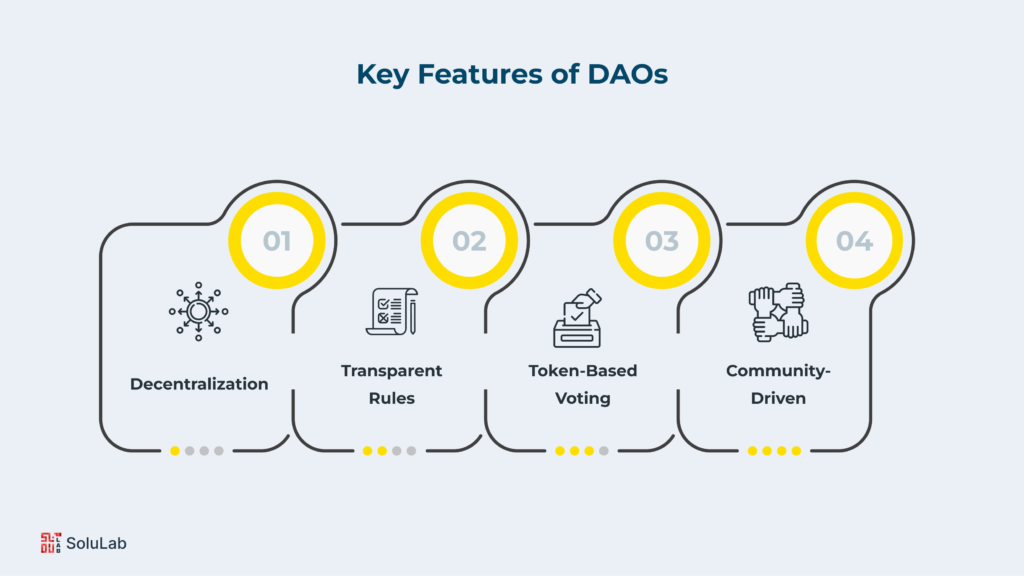
Decentralized Autonomous Organizations (DAOs) are organizations governed by smart contracts and code, rather than a centralized authority. DAOs are characterized by several key features:
- Decentralization: DAOs operate on blockchain networks, ensuring that decision-making power is distributed among token holders rather than controlled by a single entity.
- Transparent Rules: The rules and governance processes of DAOs are encoded in smart contracts, making them transparent and immutable.
- Token-Based Voting: DAOs use tokens to facilitate decision-making. Token holders can participate in governance by voting on proposals using their tokens.
- Community-Driven: DAOs are often community-driven, where members collectively determine the organization’s direction, policies, and resource allocation.
Before and After DAOs in the Evolution of NFT Platforms
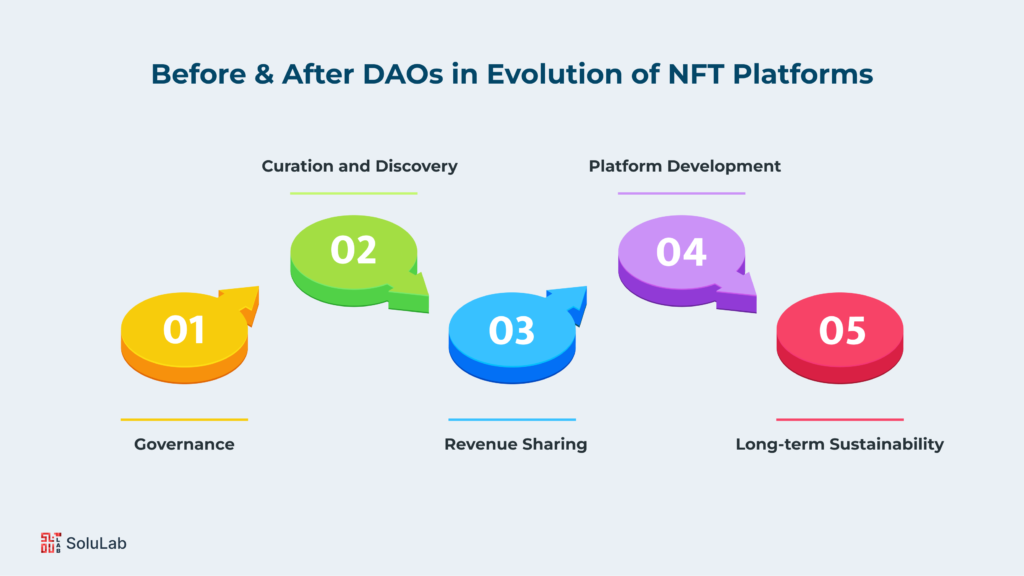
The development of NFT (Non-Fungible Token) platforms has undergone a significant transformation due to the emergence of Decentralized Autonomous Organizations (DAOs). In the pre-DAO era, NFT platforms primarily served as centralized marketplaces where users could engage in buying, selling, and trading digital assets represented as NFTs.
During this time, these platforms functioned with a traditional hierarchical structure and relied on central authorities for governance and decision-making.
However, the advent of DAO development introduced substantial changes to NFT platforms and ushered in fresh opportunities. DAOs brought decentralization, autonomy, and community-driven governance to NFT platforms, fundamentally altering their operational dynamics and granting enhanced empowerment to their users.
Here’s a detailed comparison of NFT platforms before and after the integration of DAOs:
-
Governance
Before DAOs, NFT platforms were under the control of a central authority responsible for shaping platform policies, setting fees, and curating assets. With the emergence of DAOs, governance shifted towards community involvement. DAO development platform introduced mechanisms for token holders to participate in decision-making through voting, enabling them to influence platform policies and their evolution.
-
Curation and Discovery
In the pre-DAO era, NFT platforms predominantly employed centralized methods for curating and showcasing assets, relying on platform administrators or curators to decide which items received prominence. However, DAO-based NFT platforms introduced decentralized curation models that encouraged collective participation in asset curation and discovery. Token holders gained the ability to propose and vote on featured assets, democratizing the curation process.
-
Revenue Sharing
In the absence of DAOs, NFT platforms typically collected fees or commissions from transactions, with the platform itself reaping the financial benefits. With the adoption of DAO development services, a more equitable revenue-sharing model emerged. DAOs enabled the allocation of a portion of the platform’s revenue to token holders, fostering community engagement and providing rewards to contributors.
-
Platform Development
DAOs introduced a community-driven approach to platform development and enhancement. Instead of relying exclusively on a centralized development team, NFT platforms operating under DAOs could tap into the expertise of community members across various domains. This inclusive approach led to a more diverse and innovative development landscape.
-
Long-term Sustainability
DAOs opened the door to greater long-term sustainability for NFT platforms. By affording token holders a stake in the platform and involving them in decision-making, the DAO-enabled NFT platform cultivated a heightened sense of ownership and engagement. This, in turn, nurtured a dedicated and vibrant community, contributing to the platform’s growth and enduring success.
How Might Users Profit From DAO-enabled NFT Platforms?
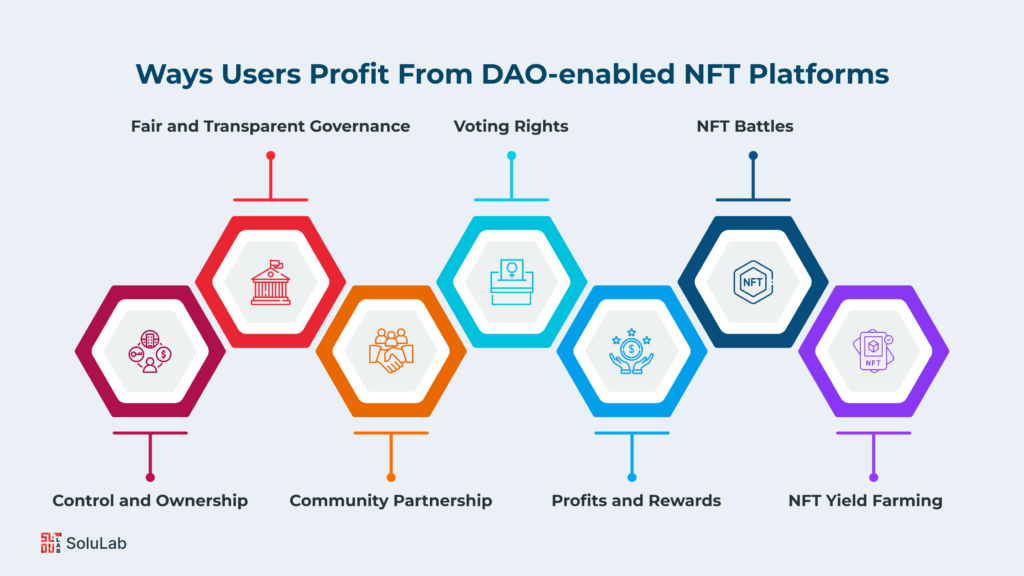
Users who use DAO-enabled NFT platforms get access to a variety of advantages, including more control, involvement, and possible rewards. Users of DAO-enabled NFT platforms can gain from them in the following ways:
-
Control and Ownership
Users enjoy a higher sense of ownership and power over DAO-enabled NFT systems. They have the ability to take part in active decision-making procedures including voting on platform regulations, governance ideas, and asset curation. Through their participation, users may influence the platform’s growth and direction in accordance with their interests and beliefs.
-
Fair and Transparent Governance
DAO-based NFT platforms offer decentralized and transparent governance methods. On the blockchain, users have access to and may validate platform operations, transactions, and decision-making procedures. This openness promotes trust and guarantees that choices about governance are made honestly and cooperatively, without the interference of a centralized power.
-
Community Partnership
NFT systems with DAO support encourage user participation and cooperation. Users may communicate, exchange ideas, and support the expansion of the platform using DAO procedures. New features, alliances, or initiatives can be suggested by community members, and the DAO can decide whether or not to adopt them.
Read Our Blog Also: An Ultimate Handbook for NFT Creators: Selecting the Best Blockchains for Your NFT Projects
-
Voting Rights
These platforms differ from normal platforms, which have identical characteristics, in terms of their governance model and management regulations. DAO-enabled NFT platforms rely on member votes to make awards and change the rules and regulations already in place. It makes it possible for any user to take part in decision-making processes and decide on future community policies through decentralized and transparent decision-making.
-
Profits and Rewards
Since gaming-based NFT platforms are cutting-edge and give their users a variety of ways to make money, interest in them keeps growing. Individuals of the NFT platform can suggest possibilities like NFT staking through DAO. By allowing them to access their NFTs and stake into liquidity pools without changing ownership of their NFTs (selling them), NFT staking enables NFT holders to create passive income. We’ll develop more inventive ways to monetize assets over time. Platforms for NFT staking are widely used and have already made it possible for NFT holders to make money using their monetization strategies.
-
NFT Battles
The NFT platform offers its customers the “NFT Battles” functionality via a decentralized application. NFT holders compete with rivals (other NFT holders) by wagering their resources. Others may stake NFT tokens in order to support their chosen NFT and receive returns in NFT tokens and digital assets.
Have A Look At Our Blog: How is Gaming Contributing to the NFT Industry?
-
NFT Yield Farming
Users who own both their NFTs and the native token of the site are eligible to engage in yield farming. In order to do this, customers must directly stake their appropriate assets in the platform’s liquidity pools, providing liquidity for the platform and generating incentives. Tokens plus a finite quantity of NFTs make up the awards. However, not every user who stakes their NFTs is eligible to get unusual NFTs as compensation; before staking their NFTs, individuals have to first assess their eligibility.
Challenges and Considerations in the Integration of DAOs in NFT Platforms
The integration of Decentralized Autonomous Organizations (DAOs) in NFT (Non-Fungible Token) platforms offers numerous advantages, but it also presents a set of challenges and considerations that must be carefully addressed. Here are some of the challenges associated with DAOs in NFT platforms:
- Complex Governance Decision-Making: Achieving consensus among diverse token holders can be challenging, leading to potential gridlock or slow decision-making processes.
- Sybil Attacks: The risk of Sybil attacks, where malicious entities create multiple fake identities to manipulate voting outcomes, poses a threat to the integrity of DAO-based governance.
- Regulatory Uncertainty: Navigating the evolving and varied regulatory landscape for DAOs and NFTs across different jurisdictions can be complex and uncertain.
Read Also: BSC NFT Marketplace Development: Everything You Need to Know
- KYC and AML Compliance: Implementing Know Your Customer (KYC) and Anti-Money Laundering (AML) compliance measures in decentralized DAOs can be difficult while maintaining user privacy.
- Token-Based Manipulation: Token holders with a significant stake may have disproportionate influence in decision-making, potentially leading to governance centralization.
- Legal and Taxation Challenges: Legal challenges related to securities laws, taxation, and consumer protection can pose significant hurdles for DAO-operated NFT platforms.
- Interoperability: Ensuring interoperability between different DAOs and NFT platforms can be challenging, hindering the seamless transfer of assets and governance structures across ecosystems.
Future Trends and Developments in DAOs for NFTs
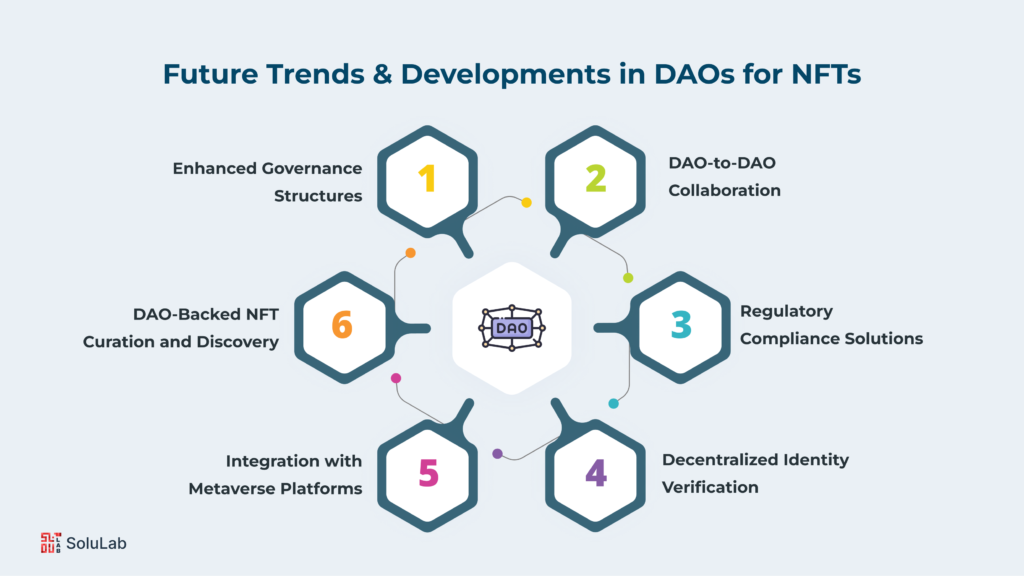
As the integration of Decentralized Autonomous Organizations (DAOs) in the NFT (Non-Fungible Token) space gains momentum, several compelling trends and developments are expected to shape the future of digital ownership and governance. Here’s a glimpse into what we can anticipate:
1. Enhanced Governance Structures
DAOs will evolve to offer more sophisticated governance structures. Multilayered DAOs, where sub-DAOs handle specific aspects of governance, may become more prevalent. This will allow for finer control and specialization in decision-making.
Enhanced governance structures will lead to more efficient and tailored decision-making processes within NFT ecosystems, making them better suited to address complex issues and adapt to the needs of their communities.
Read Blog Also: Why Should You Start Your Own NFT Marketplace Business?
2. DAO-to-DAO Collaboration
We can expect to see increased collaboration between different DAOs within the NFT space. These collaborations may involve shared resources, cross-platform interoperability, and joint initiatives.
DAO-to-DAO collaborations will foster a sense of unity and cooperation within the NFT ecosystem, enabling projects to leverage each other’s strengths, expand their reach, and create new opportunities for NFT holders.
3. Regulatory Compliance Solutions
As regulatory scrutiny of NFTs and DAOs intensifies, there will be a growing demand for compliance solutions tailored to decentralized governance models. Projects will focus on developing tools and frameworks to ensure compliance with evolving regulations.
Regulatory compliance solutions will help NFT platforms and DAOs navigate legal challenges and establish a more secure and compliant environment, potentially reducing legal risks and uncertainties.
4. Decentralized Identity Verification
Decentralized identity verification solutions will emerge to address KYC (Know Your Customer) and AML (Anti-Money Laundering) requirements without compromising user privacy. These solutions will provide a balance between compliance and decentralization.
Decentralized identity verification will enable NFT platforms to meet regulatory obligations while preserving the anonymity and privacy of users, enhancing trust and transparency in DAO-driven ecosystems.
Know More: How to Build an NFT Marketplace on Ethereum Blockchain?
5. Integration with Metaverse Platforms
DAOs in the NFT space will increasingly integrate with metaverse platforms and virtual worlds. NFT ownership and governance will extend to virtual real estate, assets, and experiences within these immersive digital environments.
This integration will create a seamless user experience, allowing NFT holders to have a unified presence and influence across multiple virtual spaces, ultimately blurring the lines between the physical and digital worlds.
6. DAO-Backed NFT Curation and Discovery
DAOs will take a more active role in curating and discovering NFT content. These decentralized curation models will empower token holders to collectively decide which NFTs gain visibility and recognition.
It will democratize the curation process, ensuring that quality NFTs receive recognition based on community consensus rather than centralized decision-makers, fostering diversity and innovation in the NFT ecosystem.
Conclusion
In conclusion, the integration of Decentralized Autonomous Organizations (DAOs) into the NFT ecosystem marks a pivotal moment in the evolution of digital ownership and governance. These autonomous structures have revolutionized NFT development platforms and NFT marketplace development services, ushering in a new era of decentralized decision-making, community empowerment, and inclusivity. While challenges such as governance complexities and regulatory considerations persist, the future holds promising trends, including enhanced governance structures, DAO-to-DAO collaborations, and innovative compliance solutions.
As we navigate the path ahead, it is clear that DAOs will continue to be a driving force, shaping the destiny of NFTs and reaffirming their position as a transformative and sustainable digital asset class. The dynamic synergy between DAOs and NFTs promises a future where digital ownership is not just about possession but active participation, where the community is at the heart of every creation, curation, and decision in the ever-expanding NFT universe.
SoluLab, with its expertise in blockchain technology and NFT development, stands at the forefront of empowering NFT platforms to harness the full potential of DAOs. Our NFT Marketplace Development services and NFT development platform solutions are designed to seamlessly integrate DAO functionality, enhancing governance, security, and user experience. We offer tailored solutions to address the challenges of scalability, regulatory compliance, and smart contract security while staying at the cutting edge of emerging trends in the NFT space. By Partnering with SoluLab, you can navigate the evolving landscape of NFTs and DAOs with confidence, unlocking new possibilities for decentralized digital ownership and community-driven success.
FAQs
1. What is the role of DAOs in NFT platforms, and how do they differ from traditional governance structures?
DAOs (Decentralized Autonomous Organizations) play a pivotal role in NFT ecosystems by shifting decision-making power from central authorities to token holders. They enable community-driven governance, granting users a direct say in platform policies and development, unlike traditional hierarchical structures.
2. How do DAOs benefit NFT creators and collectors in terms of revenue sharing and long-term sustainability?
DAOs offer a fair revenue-sharing model, automatically distributing royalties to creators on secondary sales. This incentivizes creators and fosters long-term sustainability by creating a committed and engaged community that contributes to platform growth.
3. What are the key challenges and considerations associated with implementing DAOs in NFT platforms, especially concerning governance complexities and regulatory aspects?
Challenges include achieving consensus in diverse communities, the risk of Sybil attacks, and navigating complex regulatory landscapes. To address these challenges, clear governance frameworks, identity verification mechanisms, and legal expertise are essential.
4. What trends can we expect to see in the future of DAOs in the NFT space, and how will they impact digital ownership?
The future of DAOs in the NFT space includes enhanced governance structures, DAO-to-DAO collaborations, regulatory compliance solutions, decentralized identity verification, integration with metaverse platforms, and DAO-driven curation. These trends will democratize digital ownership and foster innovation.
5. How can SoluLab assist in harnessing the benefits of DAOs for NFT platforms and what services does it offer in this regard?
SoluLab, with its blockchain and NFT development expertise, offers tailored solutions to seamlessly integrate DAO functionality into NFT platforms. Services include scalability enhancements, regulatory compliance solutions, smart contract security, and staying updated on emerging trends in the NFT space, ensuring a robust and future-ready ecosystem.





